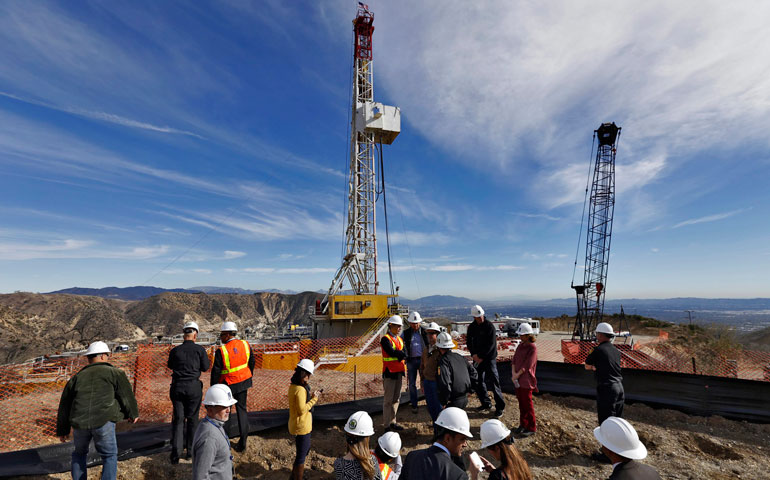
At Southern California Gas Company’s Aliso Canyon facility in Porter Ranch on Dec. 2, 2015, Los Angeles Mayor Eric Garcetti and company officials look at the drilling of a relief well to stem a natural gas leak at an adjacent well in an underground storage field. (Newscom/EPA/Irfan Khan)
 FRACKOPOLY: THE BATTLE FOR THE FUTURE OF ENERGY AND THE ENVIRONMENT
FRACKOPOLY: THE BATTLE FOR THE FUTURE OF ENERGY AND THE ENVIRONMENT
By Wenonah Hauter
Published by The New Press, 384 pages, $27.95
When it comes to petroleum and politics, it's hard to tell the good guys from the bad guys. Take, for example, California's famously eco-friendly Gov. Jerry Brown. A former seminarian, Brown has kept environmental issues at the top of his political agenda and was even invited to a Vatican conference that discussed global warming last July in the wake of Francis' encyclical "Laudato Si', on Care for Our Common Home."
In December, Brown attended the United Nations-sponsored global summit on climate change in Paris. Paradoxically, this occurred as the families who lived in Porter Ranch, a middle-class Southern California suburb, were suffering through the consequences of a massive natural gas leak.
More than 2,000 families were displaced as a natural gas storage reservoir reportedly leaked 94,000 metric tons of ozone-killing methane between late October and late February, when it was finally capped. The size and duration of this leak led consumer advocate Erin Brockovich to call it the worst environmental disaster since the 2010 BP Deepwater Horizon oil spill.
How could this happen in the land of "Governor Moonbeam," who is regarded as one of the most progressive and environmentally friendly politicians in the world? A clear explanation can be found in Wenonah Hauter's Frackopoly: The Battle for the Future of Energy and the Environment.
Hauter is the executive director of Food & Water Watch, a Washington, D.C.-based organization focused on corporate and government accountability relating to food, water and fishing. In this book, she takes on the petroleum industry, with a specific focus on the controversial energy extraction method known as hydraulic fracturing, or fracking.
Although meticulously researched, this is not an objective monograph. The author has an anti-fracking message to convey and she hammers it home.
Perhaps the greatest revelation in this book is that we can't predict which politicians will cater to the oil and gas industry. As could be expected, past and present Republican leaders strongly supported oil interests and President Ronald Reagan's deregulation policies were a boon to Big Oil.
However, Hauter describes how Democratic presidents such as John F. Kennedy, Jimmy Carter, Bill Clinton and Barack Obama also protected the petroleum industry. She notes that Obama's Clean Power Plan has been particularly helpful in supporting natural gas production, including fracking.
The book's historical overview shows how laws have been passed and monopolies broken up, but the interrelationships among the politicians, bankers and international business magnates are enduring and diffuse. These special interests are entangled in our government to a point where it would be nearly impossible to fully separate them, and the ties go back at least to the latter half of the 1800s. Hauter describes what could be metaphorically portrayed as a pit of fornicating vipers -- and fracking is their progeny.
Fracking is a natural-gas extraction process that pumps sand, water and chemicals deep underground to fracture the surrounding rock and allow gas to seep out of numerous subterranean pockets. This process has proved to be remarkably harmful to our air, land and water.
As the incident at Porter Ranch demonstrated, natural gas drilling, fracking, transportation and storage leaks allow ozone-depleting methane to disperse into the atmosphere. The author argues that fracking has created large polluted areas of the country, or what the she calls "sacrificial zones."
The pressurized water used in fracking usually begins as a chemical brew, depending on the process used, and it is always toxic upon recovery as it brings up radioactive material, heavy metals and other underground minerals. The newly made cracks and existing faults and fissures also can allow this contaminated water to escape into aquifers.
The stories in this book speak for themselves regarding the water pollution caused when methane and other chemicals seep into wells and aquifers. Hauter describes almost unbelievable cases of environmental damage.
There is the resident of Weatherford, Texas, with well water he can light on fire, and the incident of an exploding water well in Dimock Township, Pa. The author also relates how residents of Pavillion, Wyo., were advised not to drink their well water and to ventilate their bathrooms to avoid explosions while taking showers. These are a few of the many cases described in the book.
Hauter argues that fracking creates an enormous amount of wastewater. One disposal method has been to inject it deep back into the ground. This has been shown to soften underground mud and effectively lubricate faults. Oklahoma has used this method widely and Hauter reports that the number of earthquakes in that state increased 108-fold from 2009 to 2014.
Some of the jaw-dropping stories and statements in this book require a look back at the reference notes. The statistic on the huge rise in Oklahoma earthquakes is so staggering one would think some wacky left-wing rag reported it. But, no, the sources of information are the U.S. Geological Survey, the journal Science, and industry publications like the Oil & Gas Journal. The petroleum industry is such an integral part of our society that the frightening facts can simply hide in plain sight.
Yes, we know that injected wastewater is related to earthquakes. Yes, we know that a chemical brew might find unpredicted cracks and fissures and seep into our aquifers, and we know that gas leaks can simmer up at any point and any time, even in suburbia. Yet, we've been conditioned to believe that a certain level of environmental destruction is necessary if we like having fuel for our cars or heat and light for our homes.
There are a growing number of grassroots organizations fighting against fracking now, but Hauter asserts that even some large ecological groups have accepted natural gas as a "bridge fuel" and backed away from a direct fight.
If Hauter had written this as a novel using the same characters, countries and global intrigue, it would quickly become an international bestseller and a miniseries would soon follow. She describes bigger-than-life captains of industry and colorful small-time scoundrels who play the system for their own gain. There are secret meetings and global conspiracies. There are also compelling tales of "the little guy" fighting in the face of overwhelming odds -- but with too few happy endings.
Frackopoly takes the reader on a journey between fascination and despair. This work of investigative nonfiction has a wonky beat and zigzags through history, law, geology and geopolitics. Nevertheless, it is a page-turner.
[Melissa Jones is an adjunct professor of liberal studies at Brandman University in Irvine, Calif.]




